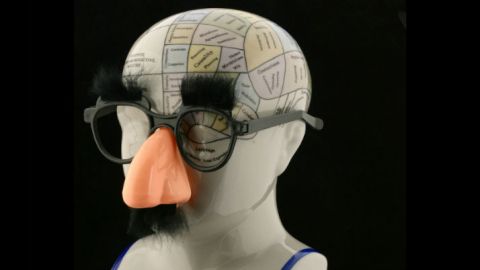Is Brain Science Just Hype?

What’s The Big Idea?
A 1993 paper in Nature announced that subjects listening to Mozart displayed increased cognitive activity through “enhanced spatial-temporal reasoning.” All the sudden, people started running to the local record store to pick up Wolfgang’s greatest hits. Search “Mozart” and “Brain” on Amazon and you will find links to over 800 results, most of which are entitled “Mozart will turn you into Einstein” – or something along those lines. Looking back on it, the Mozart Effect was a total hoax.
Similarly, when scientists told us that reservatrol – an antioxidant found in red wine – can extend our lives, the world started getting hammered on the red stuff while rationalizing it as a healthy habit. Scientists have a lot of influence on how we live our lives. This is mostly a good thing – and will help us weed out the snake oil from the spinach – but only a terribly naive optimist could think the “Mozart Effect” won’t strike again.
With the rise of the behavioral sciences in the last 30 years, our perceived knowledge of the human condition has grown significantly. Researchers have been finding all sorts of insights into human behavior. The most prominent new lens through which to view these insights is Neuroscience. The advent of the fMRI machine has led to scientists telling us “empirically”how we decide, the difference between pleasure and happiness, and even how we can become better versions of ourselves. Researchers extrapolate all sorts of new ideas that we as the readers tend to just accept as fact, based solely on some flashing lights in a specific area of the the brain. But blindly accepting what we’re told is not only ignorant, it is costly.
A guru in the broad spectrum of the behavioral sciences, Barry Schwartz understands these ideas better than just about anyone. The author of The Paradox of Choice and Practical Wisdom (two of the most-watched TED Talks ever) and a Psychology Professor at Swarthmore College, Barry spoke with Big Think about the hype surrounding Neuroscience and the need for more skepticism of the field.
Big Think: What’s the danger of not being skeptical of Neuroscience? Why is it so important that we fact-check what’s going on in the field? Is there something about Neuroscience that lends itself to over-optimistic speculation?
Barry Schwartz: The reason that neuroscience is especially “dangerous” is not that its results are more suspect than other results in psychology. Rather, it is that the audience for such results–especially the non-professional audience–accepts neuroscience findings completely uncritically. “If it’s the brain, it must be science, and if it’s science, it must be true.” So all I want is as much skepticism about neuroscience as there is about psychology in general.
BT: As Neuroscientist’s discoveries continue to multiply, how do we differentiate between legitimate findings and other not so enlightening observations that journalists build up for attention? Are there any tell-tale signs that something is total hype?
BS: The question isn’t legitimate vs. illegitimate. The question that people should ALWAYS be asking themselves when they encounter a neuroscience result is this: “what does this tell me about human beings that I didn’t already know.” At this stage of development of neuroscience, the answer to that question is almost always “nothing.” How could it not be true that something is happening in the brain whenever people do anything. Unless you are a dualist, and there are not many of them around, something is ALWAYS happening in the brain when we do anything. “Does what’s happening in the brain illuminate our understanding” is the key question. There is one more thing that is very important. People mistakenly believe that “my brain made me do it” absolves people of responsibility whereas “my deprived childhood with abusive parents made me do it” does not. In the first case, the behavior in question is seen as the output of a machine. In the second case, people think that you could always decide not to do whatever it is that you did. This is simply false. The question we should be asking is “how strong is the causal relation between X and Y?,” and not “does X, the cause, reside in the brain or in behavior?”
BT: Moving forward, how can Neuroscience best be utilized for the sake of science and exploring the human condition?
BS: It would help a lot of neuroscientists themselves were mindful of my answers above and took pains to be clear about those features of their work when they talk to the press or to non-professional audiences. The tendency, alas, is to overhype what you’ve found rather than being open about how modestly your findings advance our understanding.
What’s The Significance?
In a world where Wikipedia is our main source of facts and information, it is up to the individual to be conscious of the source and validity of the data. While Neuroscience has grown tremendously with the advent of the fMRI, more sophisticated technology does not necessarily entail more sophisticated results. Researchers are always pressed to produce results, and having this incentive in the back of their brain may lead to them forging something about their subjects’ brains. (Similarly, Big Think and other media sources covering the science scene jump at the opportunity to share important results).
In a New Yorker essay “The Truth Wears Off,” Jonah Lehrer examines the pattern whereby researchers’ results – held to be sacred artifacts of science – have been found to decline in effect. “The Decline Effect” has shown up in a number of occasions where an experiment’s original correlation is unable to be replicated. Lehrer writes:
The decline effect is troubling because it reminds us how difficult it is to prove anything. We like to pretend that our experiments define the truth for us. But that’s often not the case. Just because an idea is true doesn’t mean it can be proved. And just because an idea can be proved doesn’t mean it’s true. When the experiments are done, we still have to choose what to believe.
It is essential we do a more rigorous examination of the cause and effect of our observations, and understand that science is a long-term endeavour with many variables. Just because something is thought to be true one day does not permit it eternal validity. While Neuroscience has a bright and important future, we need to embrace our potential to make mistakes. Just as people used to believe the sun revolved around the earth, our own beliefs could be laughable to future generations. In the long run, skepticism is paramount for progress to flourish.
So before you go banging your head on the wall because a study says it helps stop procrastination, remember to take our conclusions with a grain of salt – as we surely have not seen the last of “The Mozart Effect.”





